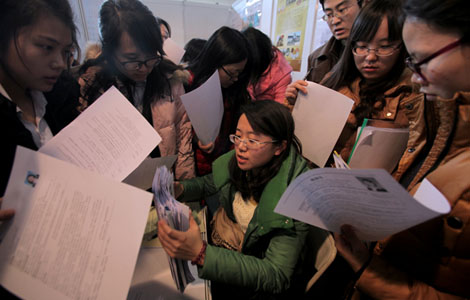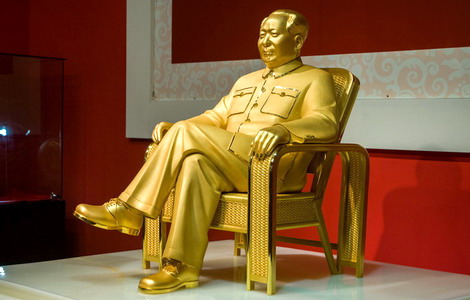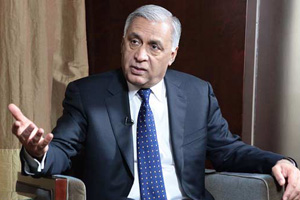UPS to deliver more parcels in China
Updated: 2013-12-14 00:17
By ZHONG NAN (China Daily)
|
||||||||
United Parcel Service Inc, the world's largest package delivery company by revenue, is looking to keep an upper hand in the Chinese market by adding 14 inner-city express services next year.
UPS began domestic courier services in 2012, when it was granted seven licenses by the State Post Bureau of China. With more goods circulating in the world's most populous market, it expanded to 19 first- and second-tier cities this year and expects to reach 33 cities in 2014.
Scott Davis, chief executive officer of UPS, said that China's middle class will grow significantly over the next 20 years and more delivery services will be needed, so the company wants to expand its network in the country.
"China will be an important market for UPS in the future and we want to have the ability to serve this marketplace," he said.
China is now the world's third-largest market for express services behind the United States and Japan. Last year, 8,200 express companies were operating in China, compared with 5,327 in 2010. The average number of pieces of mail and packages delivered amounted to 143 million a day in 2012, according to the Beijing-based China Federation of Logistics and Purchasing.
Davis believes that China does a better job in foreign trade than most of the world and that the nation is keen to sell more goods through diversified channels.
"Exporting can sometimes be intimidating and complicated for small and medium-sized businesses. However, with supportive policies, we can simplify the process with businesses in the China (Shanghai) Pilot Free Trade Zone and this could help us to seal more deals sooner or later," Davis said.
UPS owns and operates two large hubs in the country. In South China's Guangdong province, its Shenzhen Intra-Asia Hub provides services for customers doing business with emerging Asian economies, while the company's Shanghai international hub links Asia to the rest of the world.
It also set up three regional hubs in Qingdao, Chengdu and Zhengzhou in the past three years, to keep pace with the development in China's coastal, western and central regions, and it offers logistics services to high-tech manufacturers in areas surrounding those cities.
In 2012, UPS posted $54.1 billion in global revenue from its package, supply chain and freight operations. It has 399,000 workers across the world, with 6,170 in China. The company operates 208 weekly flights connecting China to the US, Europe and destinations across Asia.
The carrier is also betting on China's growing demand for healthcare products, and it established a specialist facility in Hangzhou, the capital of Zhejiang province, in the second half of the year, to handle shipments of medical products.
The new Hangzhou facility has 22,000 square meters of storage space. It's designed to store medical devices, biological products and pharmaceuticals, and to meet the distribution needs of pharmaceutical companies. Merck Sharp and Dohme, the world's second-largest drugmaker, is UPS' first partner in the facility.
Richard Loi, UPS president in China, said that expanding to the healthcare logistics field means the delivery company can now extend its industrial chain from distribution to upgraded warehousing and storage services. It also wishes to have a presence in the bulk freight of healthcare products by offering cheaper solutions for its clients.
The advantage of the new healthcare logistics service is that it comes with a number of related businesses. Delivery companies are able to make profits on ground packages, air packages, freight forwarding and logistics, as the business plays a key role in all of these areas.
"There are a lot of areas that we're looking at and we'll invest in them as time goes on," Loi said.
"Clinical trials are a big area of healthcare and there are not a lot of Chinese companies capable of providing such a high-demand logistics service. Home healthcare delivery can also be considered as a big market-growth point. As people get older, it's going to be easier for them to have the right medicine at home, instead of going to nursing homes," Loi said.
UPS opened its first Asia healthcare facility in Singapore in 2011, and so far it has followed that with the opening of three additional facilities in Hangzhou, Shanghai and Sydney.
zhongnan@chinadaily.com.cn

 Two students wounded in US school shooting
Two students wounded in US school shooting
 Postgraduates get hard lessons at job fair
Postgraduates get hard lessons at job fair
 Havens of hope open their arms to forsaken infants
Havens of hope open their arms to forsaken infants
 New Sanlu seeks to shake off image tainted by scandal
New Sanlu seeks to shake off image tainted by scandal
 Golden statue to mark anniversary of Mao's birth
Golden statue to mark anniversary of Mao's birth
 Selfies of the year 2013
Selfies of the year 2013
 Massacre victims remembered in Nanjing
Massacre victims remembered in Nanjing
 An elaborate prank
An elaborate prank
Most Viewed
Editor's Picks

|

|

|

|

|

|
Today's Top News
BYD dismisses 'inaccurate and misleading' reports
Two students wounded in US school shooting
Execution may hit co-op projects
Top leaders vow to steer steady path
Gift ban applies to festivals: official
UPS to deliver more parcels in China
Daft for preferred shares issued
UN confirms chemical arms were used repeatedly in Syria
US Weekly

|

|






